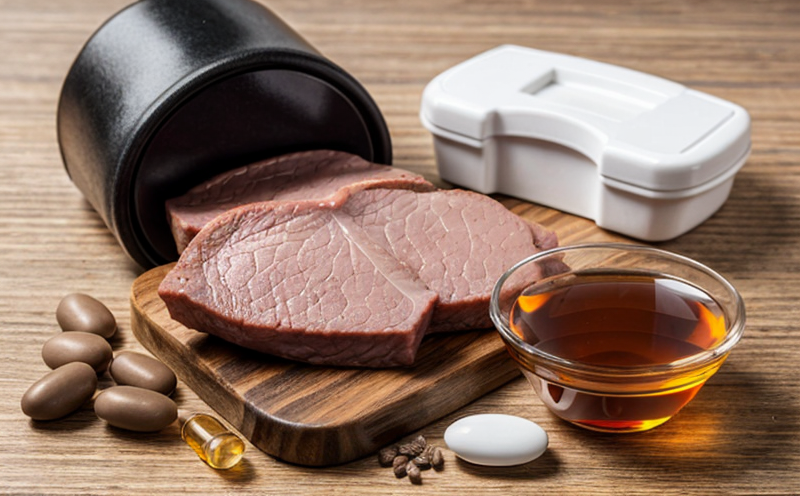Bile Salt Hydrolase Enzyme Testing in Gut Microbiome Studies
Bile salt hydrolase (BSH) enzyme testing plays a crucial role in gut microbiome studies by providing insights into the metabolic activities of microorganisms within the gastrointestinal tract. This test is particularly valuable for evaluating the health and function of the gut microbiota, which has been linked to various systemic diseases including cardiovascular disease, diabetes, and inflammatory bowel disorders.
The BSH enzyme is produced by many species of bacteria in the gut, primarily Gram-negative anaerobes such as Bacteroides spp., Fusobacterium spp., and Ruminococcus spp. These bacteria utilize bile salts from the liver to produce energy during periods of nutrient scarcity, thereby supporting their survival in a challenging environment.
In gut microbiome research, BSH enzyme activity is often measured using specific substrates like deoxycholic acid (DCA) or chenodeoxycholic acid (CDCA). The test involves incubating samples with the substrate and monitoring the breakdown of the bile salt into its constituent parts. This process can be quantified by measuring the released products, such as fatty acids or amino acids.
Specimen preparation is critical for accurate BSH enzyme testing. Samples are typically collected from stool, which provides a direct reflection of gut microbiota activity. Proper preservation and transportation conditions must be maintained to ensure sample integrity. The specimens should be kept at refrigerated temperatures (2–8°C) and processed within 24 hours of collection.
The instrumentation used for BSH enzyme testing includes automated clinical chemistry analyzers or dedicated microbial assay systems that can perform the necessary reactions efficiently. These instruments are equipped with reagents that react specifically with bile salts to produce measurable byproducts, allowing for precise quantification of BSH activity.
Acceptance criteria for the test results depend on the intended use and the specific research objectives. Typically, a higher concentration of released fatty acids or amino acids indicates greater BSH enzyme activity, which reflects higher microbial diversity and metabolic capacity in the gut microbiome.
Bile salt hydrolase testing is essential for understanding the role of bacterial metabolism in maintaining homeostasis within the gut. It helps researchers identify key species involved in bile salt utilization and assess changes in these populations under different environmental conditions or therapeutic interventions.
Benefits
The benefits of BSH enzyme testing in gut microbiome studies are manifold, offering significant advantages to various stakeholders:
- Improved Understanding of Microbial Metabolism: Provides detailed insights into the metabolic activities of gut bacteria.
- Predictive Power for Disease Risk: Helps identify potential biomarkers for diseases associated with altered gut microbiota.
- Informed Therapeutic Decisions: Guides personalized medicine approaches by understanding how different treatments affect gut flora.
- Rapid Diagnostics: Facilitates quick identification of pathogenic bacteria contributing to dysbiosis.
- Evaluation of Probiotic Efficacy: Assesses the effectiveness and safety of probiotic supplements in restoring healthy gut function.
By leveraging BSH enzyme testing, researchers can contribute to advancements in personalized healthcare strategies, ultimately leading to better patient outcomes.
Why Choose This Test
- Precision: Highly sensitive and specific detection of bile salt hydrolase activity ensures accurate results.
- Simplicity: Easy-to-use protocols minimize the learning curve for lab technicians, ensuring consistent performance.
- Reproducibility: Standardized methods and reagents guarantee reliable replication across multiple experiments.
- Comprehensive Data: Provides a complete picture of gut microbiota metabolism through quantification of released products.
- Regulatory Compliance: Adheres to international standards, ensuring that data meets rigorous quality control requirements.
The ability to precisely measure BSH enzyme activity offers unparalleled insights into the health and function of the gut microbiome. This precision is crucial for advancing research and developing new therapeutic strategies aimed at improving overall human health.
Environmental and Sustainability Contributions
Incorporating bile salt hydrolase testing into gut microbiome studies contributes positively to both environmental protection and sustainability efforts:
Eco-friendly Research Practices: By promoting a deeper understanding of gut microbiota, this research can lead to the development of eco-friendly interventions that minimize adverse impacts on human health. This knowledge supports sustainable agricultural practices by fostering beneficial microbial communities in soil.
Promotion of Sustainable Healthcare: The results from BSH enzyme testing can inform the creation of more effective and targeted treatments, reducing unnecessary medical waste and minimizing the environmental footprint associated with conventional healthcare approaches.
Sustainable Development Goals (SDGs): Aligns with SDG 3: Good Health and Well-being by contributing to advancements in personalized medicine that enhance human health. It also supports SDG 12: Responsible Consumption and Production, by promoting efficient use of resources through targeted interventions.





